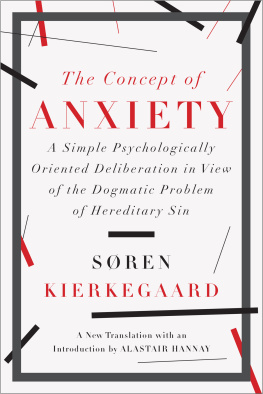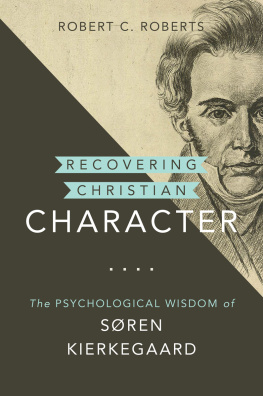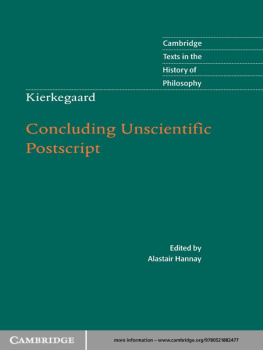Søren Kierkegaard - The Concept of Anxiety: A Simple Psychologically Oriented Deliberation in View of the Dogmatic Problem of Hereditary Sin
Here you can read online Søren Kierkegaard - The Concept of Anxiety: A Simple Psychologically Oriented Deliberation in View of the Dogmatic Problem of Hereditary Sin full text of the book (entire story) in english for free. Download pdf and epub, get meaning, cover and reviews about this ebook. year: 2015, publisher: Liveright, genre: Science. Description of the work, (preface) as well as reviews are available. Best literature library LitArk.com created for fans of good reading and offers a wide selection of genres:
Romance novel
Science fiction
Adventure
Detective
Science
History
Home and family
Prose
Art
Politics
Computer
Non-fiction
Religion
Business
Children
Humor
Choose a favorite category and find really read worthwhile books. Enjoy immersion in the world of imagination, feel the emotions of the characters or learn something new for yourself, make an fascinating discovery.
- Book:The Concept of Anxiety: A Simple Psychologically Oriented Deliberation in View of the Dogmatic Problem of Hereditary Sin
- Author:
- Publisher:Liveright
- Genre:
- Year:2015
- Rating:5 / 5
- Favourites:Add to favourites
- Your mark:
The Concept of Anxiety: A Simple Psychologically Oriented Deliberation in View of the Dogmatic Problem of Hereditary Sin: summary, description and annotation
We offer to read an annotation, description, summary or preface (depends on what the author of the book "The Concept of Anxiety: A Simple Psychologically Oriented Deliberation in View of the Dogmatic Problem of Hereditary Sin" wrote himself). If you haven't found the necessary information about the book — write in the comments, we will try to find it.
The first new translation of Kierkegaards masterwork in a generation brings to vivid life this essential work of modern philosophy.
Brilliantly synthesizing human insights with Christian dogma, Soren Kierkegaard presented, in 1844, The Concept of Anxiety as a landmark psychological deliberation, suggesting that our only hope in overcoming anxiety was not through powder and pills but by embracing it with open arms. While Kierkegaards Danish prose is surprisingly rich, previous translationsthe most recent in 1980have marginalized the work with alternately florid or slavishly wooden language. With a vibrancy never seen before in English, Alastair Hannay, the worlds foremost Kierkegaard scholar, has finally re-created its natural rhythm, eager that this overlooked classic will be revivified as the seminal work of existentialism and moral psychology that it is.
From The Concept of Anxiety:
And no Grand Inquisitor has such frightful torments in readiness as has anxiety, and no secret agent knows as cunningly how to attack the suspect in his weakest moment, or to make so seductive the trap in which he will be snared; and no discerning judge understands how to examine, yes, exanimate the accused as does anxiety, which never lets him go, not in diversion, not in noise, not at work, not by day, not by night.
Søren Kierkegaard: author's other books
Who wrote The Concept of Anxiety: A Simple Psychologically Oriented Deliberation in View of the Dogmatic Problem of Hereditary Sin? Find out the surname, the name of the author of the book and a list of all author's works by series.












